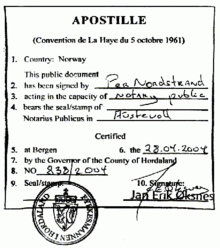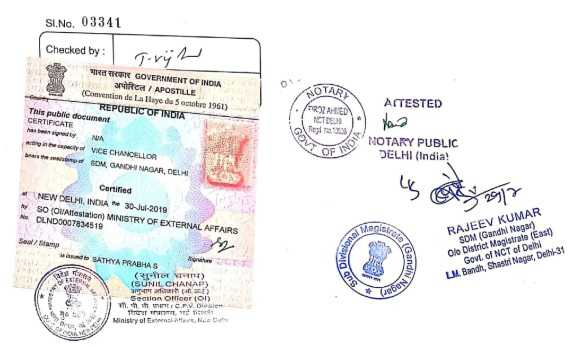December 15th, 2022 at 02:25 pm
Apostille Stamp
An Apostille Stamp is a type of certification used to certify your public documents. This stamp was created to make it easier for other countries to legally recognize documents issued from different countries, meaning that if you need to use your documents abroad, your copies of public documents must have an Apostille Stamp.
The Apostille Stamp was created as a part of an international treaty in the Hague Convention Abolishing the Requirement of Legislation for Foreign Public Documents (Apostille Treaty, or the Apostille Convention), signed in 1961. Since then many countries have joined the convention to make the process of transferring public documents to another country more convenient.
Which Countries Accept an Apostille Stamp?
As of 2021, there are 120 countries in the Apostille Treaty, as listed below:
| Albania | Denmark | Liberia | Russia |
| Andorra | Dominica | Liechtenstein | Saint Kitts and Nevis |
| Antigua and Barbuda | Dominican Republic | Lithuania | Saint Lucia |
| Argentina | Ecuador | Luxembourg | Saint Vincent and Grenadines |
| Armenia | El Salvador | Malawi | Samoa |
| Australia | Estonia | Malta | San Marino |
| Austria | Eswatini | Marshall Islands | Sao Tome and Principe |
| Azerbaijan | Fiji | Mauritius | Serbia |
| Bahamas | Finland | Mexico | Seychelles |
| Bahrain | France | Moldova | Singapore |
| Barbados | Georgia | Monaco | Slovakia |
| Belarus | Germany | Mongolia | Slovenia |
| Belgium | Greece | Montenegro | South Africa |
| Belize | Grenada | Morocco | South Korea |
| Bolivia | Guatemala | Namibia | Spain |
| Bosnia and Herzegovina | Guyana | Netherlands | Suriname |
| Botswana | Honduras | New Zealand | Sweden |
| Brazil | Hungary | Nicaragua | Switzerland |
| Brunei | Iceland | Niue | Tajikistan |
| Bulgaria | India | North Macedonia | Tonga |
| Burundi | Ireland | Norway | Trinidad and Tobago |
| Cape Verde | Israel | Oman | Tunisia |
| Chile | Italy | Palau | Turkey |
| China | Jamaica | Panama | Ukraine |
| Colombia | Japan | Paraguay | United Kingdom |
| Cook Islands | Kazakhstan | Peru | United States |
| Costa Rica | Kosovo | Philippines | Uruguay |
| Croatia | Kyrgyzstan | Poland | Uzbekistan |
| Cyprus | Latvia | Portugal | Vanuatu |
| Czech Republic | Lesotho | Romania | Venezuela |
Documents that Require an Apostille Stamp
Only public documents require apostilles, some of which include the following:
- Birth certificate
- Marriage certificate
- Death certificate
- Powers of attorney
- University (any academic) diplomas
- Business registration
- Court orders
Where Can I Get an Apostille Stamp?
You can get an Apostille Stamp in one of the following offices in your country:
- Embassy
- Ministry
- Court
- Local government
A list of eligible authorities that can give you an Apostille Stamp is managed by the Hauge Conference on Private International Law. However, each country has its own specifics for Apostille Stamps.
For example, in the US the Secretary of State (for each state) and their deputies can issue apostilles, while in the UK, you can get a stamp from the Foreign and Commonwealth Office in Milton Keynes.
When Do I Need an Apostille Stamp?
You need an Apostille Stamp when your documents have to be recognized internationally, i.e., for the following reasons:
- Visa applications
- Studying abroad
- Working abroad
- Joining a partner in another country
How to Get an Apostille Stamp?
This is how you get an Apostille Stamp:
- Make copies of your original public documents. Sometimes for visa applications, you may be required to submit original documents (that you will receive back) but do not submit originals unless specifically asked for.
- Get your documents notarized. Copies of original documents have to be certified by a notary public official before you can get an Apostille stamp.
- Send your documents to the appropriate office. If you know which office in your country is authorized to issue apostilles, then send your documents to get the stamp.
- Pay for the service. To get your Apostille Stamp, you must submit a fee at the authorized office.
Apostille Stamp Cost
Prices for an Apostille Stamp usually go around 20$ to 50$, depending on the country that issues the stamp. However, if you use a services agency to get your documents certified, you may be asked to pay as much as 200$.
What Does an Apostille Certificate Look Like?
An Apostille Stamp may appear in different forms, sizes, or colors depending on your country. However, it’s usually a stamp or printed, that has “Apostille” written at the top, and under it the following text; Convention de La Haye du 5 octobre 1961.
Underneath the title, you will usually find the following information:
- Country (e.g., Germany)
- Name of the person who is requesting the stamp (e.g. John Smith)
- Acting in the capacity of (Notary Public)
- Bears the stamp of (Name of Institution)
Certified
- At (name of the authority issuing the stamp)
- The (date when you received the stamp)
- By (the official who is signing the stamp)
- Number
- The stamp of authority
- Signature of the person who issued the Apostille Stamp

Sometimes the stamp may be found on the back of a document, on the document, or as an attachment.
Is an Apostille the Same as a Notary?
Technically, an apostille and notary serve the same function. However, the main difference is that a notary is used domestically, meaning that your notarized documents are valid only within the country that they were certified in, while an apostille makes your documents valid in other countries.
What if My Country Doesn’t Issue Apostilles?
If your country doesn’t belong to the Apostille Treaty, you have to legalize your documents to have them internationally certified. Legalization is a complicated process that usually required double certification.
For example, your documents must first be certified by the foreign ministry of the country that initially issued the document, let’s say the ministry in your home country. Afterwards, your document has to be certified by the ministry of the government of the country where you need to use the record in question. Usually, you can get one of the certifications in an embassy or consulate.
Apostille Stamp vs Notarization vs Legalization
Here is an overview of the main differences between these three legal processes:
| Apostille | Notarization | Legalization |
|---|---|---|
| Only a certain number of countries issue apostilles. | Notarizations happen in every country. | Every country is in charge of legalizing documents as required. |
| Apostilles are recognized internationally. | Notarizations are only valid within the issuing country. | Legalizations are also recognized in every country (is a more complicated process). |
| Apostille stamps are issued by specific governmental bodies. | A notary public can notarize documents. | Legalization of documents usually happens in specific ministries. |

Leave a Reply